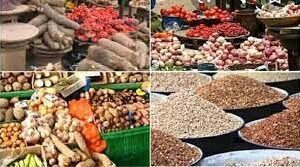When President Muhammadu Buhari unveiled the three-towered rice pyramids in Maiduguri, Borno state, it came as a surprise to many considering the activities of Boko Haram. AWAAL GATA examines how Kabir Abiso has been able to turn the insurgency-ravaged Borno into a rice-producing state.
Prelude In the 1960s before Nigeria abandoned Agriculture for oil, it was one of the most promising agricultural producing country in the world. Between 1962 and 1968, Agriculture export crops were Nigeria’s main foreign exchange earners. The country was number one globally in palm oil exports, well ahead of Malaysia and Indonesia, and exported 47 percent of all groundnuts, putting it ahead of the US and Argentina. After the discovery of oil, the status of agriculture as a powerhouse declined steeply. While Nigeria once provided 18 percent of the global production of cocoa, second in the world in the 1960s, that figure is now down to 8 percent. Similarly, the country which produced 65 percent of tomatoes in west Africa,is now the largest importer of tomato paste. Experts say the Arab-Israeli war in 1972 triggered the rounds of oil booms that started in that same year. . However, in recent years the prices of oil continued to fluctuate and this affected the economy bringing it into recession after oil price plunged from $114 per barrel to less than $30 in mid 2014. This prompted loud calls for economic diversification after 70 per cent of Nigeria’s revenue was wiped away as a result of the fall in oil price. Government diversification agenda Determined to navigate the country out of economic doldrums after assuming office in 2015, the President Muhammadu Buhari led administration made agriculture the fulcrum of its economic policy. The revolution in agriculture which herald the government policy drive led to the emergence of Dr. Kabir Abiso. Abiso, 45, is a multi-certified farmer and community worker from the North-east, state of Borno. The Boko Haram insurgency which started in 2009 in the North-east had devastated the economy of the region, but with the coming of President Buhari, relative peace was restored, making economic recovery the next task. One of the vehicle used by the government to achieve its diversification drive is the Anchors Borrowers Programme Kabir Abiso: Boosting FG’s agric revolution When President Muhammadu Buhari unveiled the three-towered rice pyramids in Maiduguri, Borno state, it came as a surprise to many considering the activities of Boko Haram. AWAAL GATA examines how Kabir Abiso has been able to turn the insurgency-ravaged Borno into a rice-producing state. Abiso and Governor Kashim Shettima of Borno state, during the flag-off of one of his farming programmes recently (ABP) that was established by the Central Bank of Nigeria (CBN) to help small holder farmers access funds , in line with its function of development.
ABP, launched by the President in November 2015, creates a linkage between anchor companies involved in the processing and small holder farmers (SHFs) of the required key agricultural commodities. The programme thrust is the provision of farm inputs and cash (for farm labor) to SHFs to boost production of these commodities, stabilize inputs supply to agro-processors and address the country’s negative balance of payments on food. At harvest, SHFs are expected to produce to the Agro-processor (Anchor) who pays the cash equivalent to their accounts. The Abiso revolution In Borno, thanks to Walwanne and Sons, a company owned by Abiso, ABP is meeting its targets.
The company is the CBN’s anchor in the implementation of the ABP in Borno. Walwanne’s whose work is mainly in paddy rice involving 18 thousand farmers, including those who lost their livelihoods as a result of the insurgency. The company provided the farmers with funding, expertise and tools to enhance bumper yields.
This number is expected to rise to 100 or 200 thousand by 2020. . And because Walwanne’s innovation paid-off when President Buhari visited Maiduguri, he unveiled the produce, a threetowered rice pyramid amounting to 33 thousand bags from three groups of farmers. While commending Abiso for his company’s innovation, Governor Kashim Shettima of Borno state said the produce was an impressive contribution to the revolution the federal government has been recording in the sector. The governor noted that apart from enhancing food security in the insurgency-ravaged region, it would also contribute to the zone’s foreign exports.
Abiso, who bagged a PhD. from Oxford University, Namibia, and also holds executive membership of dozens of farmers’ association across the country, is being strongly recommended to the federal government by farmers for the conferment of the Order of Niger (OON), for his innovation and contributions to agriculture in the country. For Abiso’s, he is more concerned with working with more farmers, especially the youths, in order to make food more available at the the same time create jobs and wealth.



